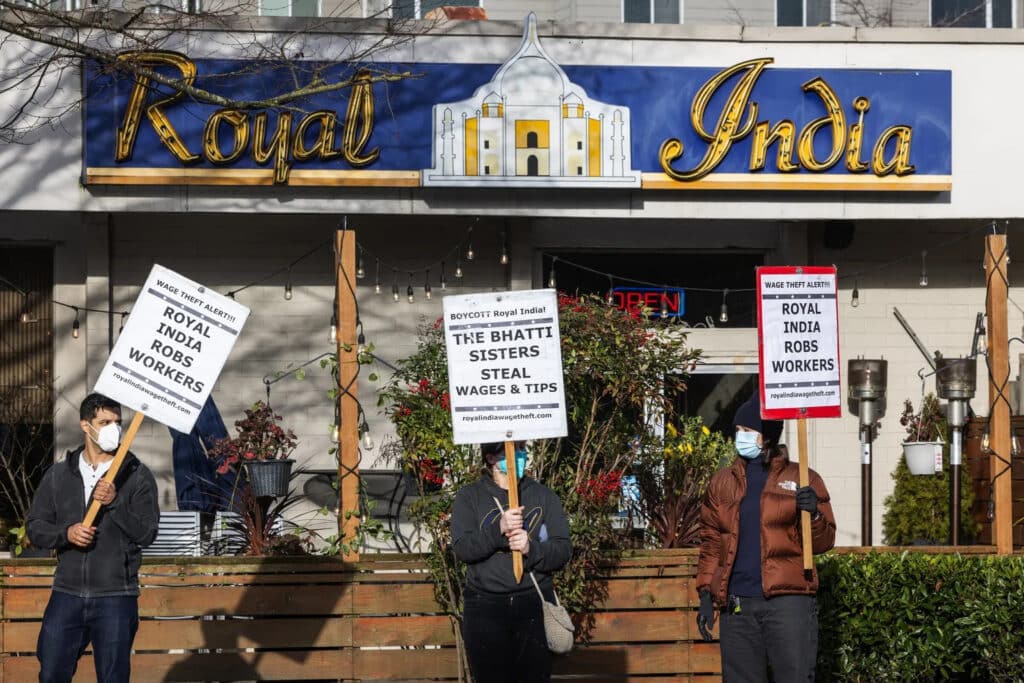By Jackie Varriano, The Seattle Times
Former Royal India restaurant owners Mohammad Rashid Bhatti and Aeisha Bhatti face a total of 10 counts of felony theft for allegedly failing to pay employees nearly $45,000 in wages at their Seattle-area restaurants from 2021 to 2023. The father and daughter pleaded not guilty on June 4, according to a news release from the Washington State Department of Labor and Industries.

The charges follow a Labor and Industries investigation that focused on almost $45,000 in unpaid wages stemming from 41 separate complaints by Royal India employees over a two-year span.
Individual amounts of unpaid wages in the case range from $820 to $20,394.10.
L&I turned the case over to the state attorney general in February 2023. The charges include one count of first-degree theft and eight counts of second-degree theft, alleged against both Mohammad and Aeisha Bhatti, and one additional count of second-degree theft against Aeisha.
The charges have steep penalties. A first-degree felony theft conviction carries a maximum fine of $20,000 and up to 10 years in prison, while a second-degree conviction carries a maximum fine of $10,000 and up to five years in prison.
Representatives for Royal India did not respond to request for comment on this story.
Since 2019, L&I has issued 16 notices of assessment against Royal India, totaling $128,457.70 in wages plus an additional $40,460.80 in penalties. L&I has collected about 28% of that total amount: $47,763.24. That disparity between notices of assessment and amount collected can be attributed to the state’s poor success rate at recovering wages.
Bryan Templeton, Labor and Industries’ employment standards program manager, said Tuesday that it’s “relatively rare to have felony charges in wage theft cases.” He said the department can refer cases to the state attorney general after establishing “what appears to be a clear intent to withhold wages from workers.”
Templeton said the department ultimately handed the Royal India case to the AG’s office due to the “sheer amount of complaints, the frequency of department action against the employer and the continued violations of wage law.”
According to the L&I investigation, Royal India employees reported paychecks that bounced or never arrived. A state investigator obtained search warrants for Royal India’s finances and was able to prove that the company had the ability to pay employees — “but didn’t,” the news release said.
The Seattle Times reported in April 2024 that Royal India, which at the time had locations in Lynnwood and Kirkland, faced more wage theft complaints than any other non-chain restaurant in Washington over a five-year period. The Times found last year that the Bhattis had been the subject of nearly 40 complaints in that time period.
At the time of that Seattle Times report, L&I had collected $42,051 out of a total of $121,662 in wages, interest and penalties that the Bhattis owed to workers.
The Seattle Times report last year also showed that, since 2018, the state has continuously decreased its success rate in recovered wages. That rate fell from 60% in 2018 to 12.7% in 2022. While wage theft issues occur across industries in Washington, the hospitality industry generates the most complaints.
The Kirkland location of Royal India was the site of repeated pickets from the Seattle Solidarity Network, a worker advocacy network; it closed in March 2024 due to a stop-work order from Kirkland’s fire inspectors related to a kitchen fire hood suppression system that violated regulations. A King County health inspector cited the restaurant for multiple violations on the same day, including a lack of food worker cards. The restaurant never reopened.
The Lynnwood restaurant was cited by a Snohomish County health inspector on March 15, 2024, for black mold in an ice machine and ingredients that were held at unsafe temperatures. The location closed shortly thereafter, then reopened with a new name under new ownership.
Employees can put a lien on their employers’ property and L&I has the authority to foreclose on property after wage liens are placed, according to Washington’s Wage Recovery Act. But L&I’s collections program manager, Steve Beaty, said in April 2024 that the agency hadn’t exercised that option in the past.
Read the original article here.




